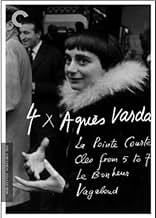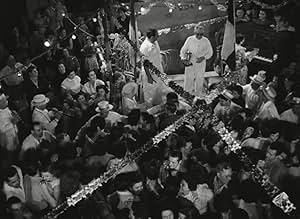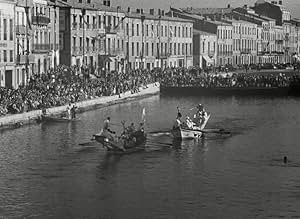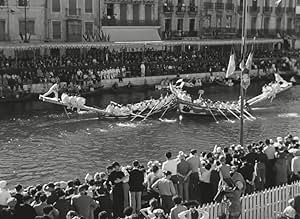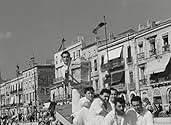IMDb RATING
7.0/10
4.6K
YOUR RATING
Follow the story of a couple who goes to a small French fishing village to try to solve the problems of their deteriorating marriage.Follow the story of a couple who goes to a small French fishing village to try to solve the problems of their deteriorating marriage.Follow the story of a couple who goes to a small French fishing village to try to solve the problems of their deteriorating marriage.
- Director
- Writer
- All cast & crew
- Production, box office & more at IMDbPro
Featured reviews
La Pointe Courte is a small jut of land on the east side of Le Canal de Sète, which connects L'Étang de Thau to the Mediterranean Sea. In the mid-1950s, it harbored a small fishing village (perhaps it still does, for all I know) which provides the setting for this film. Written and directed by 26-year old Agnès (née Arlette) Varda, this, her first and perhaps her best film, is credited by some film critics and historians as the first in the French New Wave.
A young (24) Philippe Noiret plays a native of the village who returns from Paris after many years for a short vacation. Heretofore, I was familiar with Noiret only with some of his much later films. Silvia Monfort, with whom I was previously unfamiliar, and who had one of the most unusual faces I've seen on film, plays the disillusioned Parisian wife who joins him five days later to discuss their marriage.
What's interesting about this film are its two intertwining parts. One part, shot in a familiar narrative style, concerns the everyday life and concerns of the villagers. The other part depicts the conversations of the couple in an artistic style full of fascinating images and interesting camera angles, a style which takes full advantage of Varda's photographer's eye. (Varda used three different cinematographers on this shoot, but I don't know which of them photographed which scenes.)
Varda chose the location for the film after a visit there for an assignment as a still photographer. What I liked best about the part involving just the couple were the slow pans of the environments, almost as if Varda were trying to capture the characters' surroundings in a series of stills. On the other hand, I found somewhat disturbing the obtrusive soundtrack of a clarinet, which went counter to the notion that a soundtrack is supposed to enhance the mood of the scene, not play against it as I found this to do. Perhaps that is part of what accounts for this being credited as a New Wave film.
A young (24) Philippe Noiret plays a native of the village who returns from Paris after many years for a short vacation. Heretofore, I was familiar with Noiret only with some of his much later films. Silvia Monfort, with whom I was previously unfamiliar, and who had one of the most unusual faces I've seen on film, plays the disillusioned Parisian wife who joins him five days later to discuss their marriage.
What's interesting about this film are its two intertwining parts. One part, shot in a familiar narrative style, concerns the everyday life and concerns of the villagers. The other part depicts the conversations of the couple in an artistic style full of fascinating images and interesting camera angles, a style which takes full advantage of Varda's photographer's eye. (Varda used three different cinematographers on this shoot, but I don't know which of them photographed which scenes.)
Varda chose the location for the film after a visit there for an assignment as a still photographer. What I liked best about the part involving just the couple were the slow pans of the environments, almost as if Varda were trying to capture the characters' surroundings in a series of stills. On the other hand, I found somewhat disturbing the obtrusive soundtrack of a clarinet, which went counter to the notion that a soundtrack is supposed to enhance the mood of the scene, not play against it as I found this to do. Perhaps that is part of what accounts for this being credited as a New Wave film.
10zetes
This film, Varda's directorial debut, is as impressive and accomplished as any of the other New Wavers' debuts. It's definitely on the same level as Jean-Luc Godard's Breathless, Francois Truffaut's The 400 Blows, or Alain Resnais's Hiroshima, Mon Amour (Resnais actually worked as the editor for this film). I actually think I prefer it to all three of those (as well as the other three films of Varda's that I've seen). Historically, it's one of the most fascinating films I've ever witnessed. It, in one of its two sections, sprouts from a mixture of both French Poetic Realism of the 1930s and Italian Neorealism in the 1940s. It contains the social drama of such Neorealism classics as Visconti's La Terra Trema, as this plotline deals with a group of poor fishermen and their families. However, Varda doesn't play this hand melodramatically at all. Even when a character dies, we only witness his mourning in a precisely documentarian way. We aren't asked to feel any real emotion for him, which, for some reason, makes it all the more profound. In this way, the film resembles the French poetic realism classics. L'Atalante is clearly echoed, as stray cats occupy many empty spaces in the composition; they appear in nearly every scene in some capacity. Also, the village festival that takes up most of its tail end resembles very much the folksy rural wedding at the beginning of L'Atalante. The film also contains the good humor of Vigo's masterpiece. The second half of the film alternates with the first, switching over exactly every ten minutes, a technique which Varda kind of pilfered from William Faulkner's Wild Palms (aka If I Forget Thee, Jerusalem), a novel which Godard brings up in two of his films, Breathless and Two or Three Things I Know About Her. This second half points toward the future. The French New Wave, just getting underway in 1956 (although the program notes that I received insisted that it was made in 1954), comes to full bloom here. This half, which deals with a husband and wife who have started to grow tired of each other, consists of beautifully choreographed and composed shots of the two lovers strolling along the beaches of the fishing town. The style here is instantly recognizable as one which Resnais would adopt in Hiroshima Mon Amour and Last Year at Marienbad, and even has that semi-resigned feeling to it, as if, in a way, it's half-joking. What's really shocking is that this section does not just predict some of the techniques of the French New Wave, but also the style of Ingmar Bergman's films. I would doubt that Bergman was influenced at all by this film, as it's doubtful he ever saw it. Besides, he was well on his way to hitting his peaks by 1954, as we can see from such early masterpieces as Sawdust and Tinsel. But there are some shots in this film that, once again, will instantly call to mind nearly identical ones from films such as The Seventh Seal and, even more so, Persona.
While it's a lot of fun to identify these old and new (and future) trends in La Pointe Courte, the film more than stands up on its own. Besides, according to the program notes, Agnès Varda was no great cinephile, unlike the other French New Wavers. The two storylines, and their differing styles, complement each other perfectly. It helps that Varda's direction is impeccable. Before she came to the cinema, she was a photojournalist, and it's extremely obvious. Her composition is absolutely stunning, with a lot of concentration on surface textures. The film opens with a tight close-up of a handcrafted wooden chair. You can't tell what it is initially, but as the camera follows the grooves and backs up, the object is revealed for what it is. When one character goes to the train station to pick up his wife, the shot is absolutely award-worthy with its multiple diagonals in the train tracks and the power lines in the distance. The use of sound in the film is also amazing. It's interesting when sound effects are included and when they're occluded. When the married couple walks through a field, there are carts squeaking down rusty tracks (it's a very odd event, but quite remarkable to see and hear). But later, when a large train passes by them only a dozen feet away, we don't hear it at all. Godard would play with sound more thoroughly, but never as subtly.
It's a rather great tragedy that La Pointe Courte has gone almost entirely unavailable. It barely got a release when it was first made, and, even after Varda gained prominence in the French cinema, it seems to have effectively dropped off the face of the planet. I hope that someday there will be a full retrospective of her work on DVD. This film deserves to impress others as much as it impressed me. 10/10.
While it's a lot of fun to identify these old and new (and future) trends in La Pointe Courte, the film more than stands up on its own. Besides, according to the program notes, Agnès Varda was no great cinephile, unlike the other French New Wavers. The two storylines, and their differing styles, complement each other perfectly. It helps that Varda's direction is impeccable. Before she came to the cinema, she was a photojournalist, and it's extremely obvious. Her composition is absolutely stunning, with a lot of concentration on surface textures. The film opens with a tight close-up of a handcrafted wooden chair. You can't tell what it is initially, but as the camera follows the grooves and backs up, the object is revealed for what it is. When one character goes to the train station to pick up his wife, the shot is absolutely award-worthy with its multiple diagonals in the train tracks and the power lines in the distance. The use of sound in the film is also amazing. It's interesting when sound effects are included and when they're occluded. When the married couple walks through a field, there are carts squeaking down rusty tracks (it's a very odd event, but quite remarkable to see and hear). But later, when a large train passes by them only a dozen feet away, we don't hear it at all. Godard would play with sound more thoroughly, but never as subtly.
It's a rather great tragedy that La Pointe Courte has gone almost entirely unavailable. It barely got a release when it was first made, and, even after Varda gained prominence in the French cinema, it seems to have effectively dropped off the face of the planet. I hope that someday there will be a full retrospective of her work on DVD. This film deserves to impress others as much as it impressed me. 10/10.
Agnès Varda's career began by the seaside in a small fisher port near Sète and temporarily ended in 2009 with "Les Plages D'Agnès" (Agnès' Beaches). Her debut was a commercial fiasco, only one theater in Paris showed it when it was released (Jean Louis Chéret, Studio-Parnasse).
The part of the man was first intended for George Wilson but he became ill and Philippe Noiret replaced him. This actor didn't like his performance, he thought he was too young (26) and the choice of Wilson was relevant (34). He said he was absent and the character eluded him. The critics thrashed him.
Hailed as the first movie of the Nouvelle Vague, the movie owes at least as much to Italian Neo-realism (Rossellini's "Viaggio In Italia" which depicted a couple's trip whose marriage was on the rocks and Visconti's "La Terra Trema" which dealt with the plight of the fishermen in a small village).
What is definitely "Nouvelle Vague" is the shoestring budget (four times less than "Breathless") and the literary, intellectual, "overwritten" dialogs which seem today almost unbearable; this bourgeois couple complaining about their heartaches, contemplating their navels, walks through the crowd as if the inhabitants of the village didn't exist. They don't relate to them: the only move the man makes is to give an ice-cream to a child. That's not much for someone who spent his whole childhood in the place. Filming on location wasn't the Nouvelle Vague's invention as too many naive people still believe today; for the record "l'Hirondelle Et La Mésange" was filmed entirely on location in...1928.
The depiction of the village wanders drastically from the precepts of the Nouvelle Vague busy being born but recalls the two Italian works mentioned above. We feel that Varda cares for them even if her two principals don't. She cares for their problems with the food hygiene people or with the coastguards'. She feels for Raphaël the young man to be jailed for five days as the gendarmes do for him. We learn he is an Inscrit Maritime (that was the name of the conscripts who lived on the seaside) and he is to do his military service: even if Varda doesn't mention it, we do know he'll have to fight in a dirty war (the Algeria war), like Antoine in "Cleo De 5 à 7".
I don't think like the precedent user that Varda's debut was her best. Actually "Cléo..." is much better. There are similarities between the two works: both Cléo and the couple move in a world they can't relate to. But the key to the 1961 effort is the fact that Cléo opens up and thanks to a soldier soon returning to fight becomes aware that people exist outside her petty world. When she takes her glasses off, what a symbol! But for the man and the woman of "La Pointe Courte" (The Short Headland) -they are only referred through this, bearing no names- they will stay with their inflated egos, their selfishness.
"They are always talking, they mustn't be happy" says a fisher's wife.
The short headland was a blind alley.
The part of the man was first intended for George Wilson but he became ill and Philippe Noiret replaced him. This actor didn't like his performance, he thought he was too young (26) and the choice of Wilson was relevant (34). He said he was absent and the character eluded him. The critics thrashed him.
Hailed as the first movie of the Nouvelle Vague, the movie owes at least as much to Italian Neo-realism (Rossellini's "Viaggio In Italia" which depicted a couple's trip whose marriage was on the rocks and Visconti's "La Terra Trema" which dealt with the plight of the fishermen in a small village).
What is definitely "Nouvelle Vague" is the shoestring budget (four times less than "Breathless") and the literary, intellectual, "overwritten" dialogs which seem today almost unbearable; this bourgeois couple complaining about their heartaches, contemplating their navels, walks through the crowd as if the inhabitants of the village didn't exist. They don't relate to them: the only move the man makes is to give an ice-cream to a child. That's not much for someone who spent his whole childhood in the place. Filming on location wasn't the Nouvelle Vague's invention as too many naive people still believe today; for the record "l'Hirondelle Et La Mésange" was filmed entirely on location in...1928.
The depiction of the village wanders drastically from the precepts of the Nouvelle Vague busy being born but recalls the two Italian works mentioned above. We feel that Varda cares for them even if her two principals don't. She cares for their problems with the food hygiene people or with the coastguards'. She feels for Raphaël the young man to be jailed for five days as the gendarmes do for him. We learn he is an Inscrit Maritime (that was the name of the conscripts who lived on the seaside) and he is to do his military service: even if Varda doesn't mention it, we do know he'll have to fight in a dirty war (the Algeria war), like Antoine in "Cleo De 5 à 7".
I don't think like the precedent user that Varda's debut was her best. Actually "Cléo..." is much better. There are similarities between the two works: both Cléo and the couple move in a world they can't relate to. But the key to the 1961 effort is the fact that Cléo opens up and thanks to a soldier soon returning to fight becomes aware that people exist outside her petty world. When she takes her glasses off, what a symbol! But for the man and the woman of "La Pointe Courte" (The Short Headland) -they are only referred through this, bearing no names- they will stay with their inflated egos, their selfishness.
"They are always talking, they mustn't be happy" says a fisher's wife.
The short headland was a blind alley.
Agnès Varda began her career in 1954 as a feature film director with this movie that tells two separate stories in reciprocal counterpoint: daily life at a fishing village near Sète in France with its joys and dramatic moments and the relationship between husband and wife when she who is a Parisian returns to him after he had chosen to return to his birthplace where he feels now very happy but that doesn't seem to please her very much at first and puts their marriage in danger. This situation is given in a series of soft dialogues between them which don't reveal themselves deep and meaningful enough to make us feel the sentiments behind them. Varda has done much better later with such very good movies like "Le Bonheur" or "Cléo de 5 à 7". However this movie is also classified as a landmark in the New Wave of French cinema that began about that time with names like Truffaut, Godard and Chabrol. It's this historical value that mainly makes this movie worth to be seen.
Highlights:
Lowlights:
- Visually often very beautiful.
- The exploration into marriage and what happens to a relationship after the initial thrill, discovery, and romance phase transitions into less pyrotechnics, and just knowing the other person almost as a part of yourself. The woman (Silvia Monfort) misses what she once had, whereas her husband (Philippe Noiret) is more content, and the two talk about it in very honest ways.
- The film seems to be right at the nexus of Italian neorealism and the French New Wave, with interesting aspects of each. It shows us the world of these (real) working class fishermen with their homes filled with kids, and does so with the flair of creative technique. Hooray it was made by a woman director, Agnès Varda.
- Loved the jousting scenes in the canal.
- Also loved the black cat doing an impromptu stretch in the background of one scene, effectively stealing it from the couple.
Lowlights:
- The story is lacking. There's a point in putting the cultural traditions of the fishing villagers and their occasional struggles with life side by side with this couple's difficulties in the cultural tradition of marriage, but the connective tissue is tenuous, and there isn't a lot going on here that's truly compelling.
- While the marital conflict is interesting and the dialogue explores it reasonably well, the way the actors deliver their discussion is so passionless it's as if they were sleepwalking through their roles. I believe it's meant to reflect the state their relationship has gotten to, but I think it was carried a little too far.
- The score is weirdly jaunty, and it's awful. It's almost as if the newness of the film style made figuring out what type of music would go with it a mystery, either that or it was an attempt to breathe life into what is a pretty quiet film. Either way, it doesn't work.
- Did we need the shot of the dead cat?
Did you know
- TriviaThis film is considered by many critics as the starting point of the French New Wave film movement.
- GoofsThe entire movie has been shot without sound and dubbed later, and it shows. At several points in the movie, the dialogue does not match the lip movements at all. For instance, early in the movie, when Jules' wife tells the other woman that it was Jules who scared the inspectors.
- ConnectionsFeatured in Great Directors (2009)
- How long is La Pointe Courte?Powered by Alexa
Details
Box office
- Gross worldwide
- $1,596
- Runtime1 hour 21 minutes
- Color
- Sound mix
- Aspect ratio
- 1.37 : 1
Contribute to this page
Suggest an edit or add missing content



